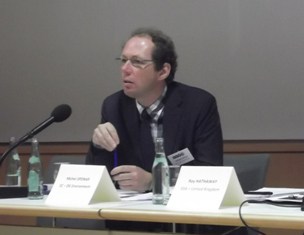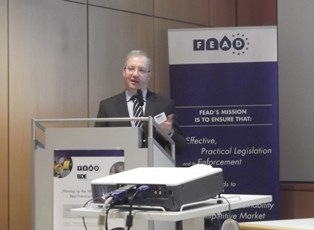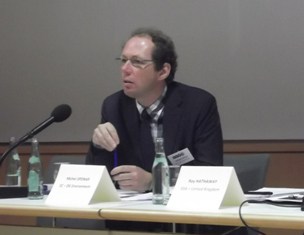The European Commission has said it will use both carrots and sticks to ensure member states move waste up the waste hierarchy and comply with waste legislation.
Speaking at a seminar on moving up the waste hierarchy best practice examples in Munich on Thursday (May 11), Michel Sponar, policy officer with the European Commissions environment directorate, explained that the 2008 Waste Framework Directive (WFD)requires member states to treat waste according to a five-step hierarchy. This places most importance on waste prevention followed by preparation for reuse, recycling, others forms of recovery (including incineration) and disposal.

The seminar was organised by the European Federation of Waste Management and Environmental Services (FEAD) and was held alongside the IFAT ENTSORGA trade fair (see letsrecycle.com story).
While Mr Sponar stressed the need for newer EU member states such as Bulgaria and Poland to divert more waste from landfill, he said older member states such as Germany and Denmark which are heavily reliant on incineration need to change their focus too, by sending more waste for recycling and composting.
And, he said all member statesshould prioritise waste prevention andmust produce Waste Prevention Plans by the end of 2013.
Mr Sponar said: We support first prevention, then preparation for reuse, then recycling (composting), other recovery, then disposal. Our hierarchy is very clear.
We are hoping that next year member states will produce waste prevention plans. We will maintain pressure on that.
Funds
Mr Sponar said the Commission would be aligning EU structural funds with the waste hierarchy to incentivise prevention, reuse and recycling which he described as a ‘carrot’. But, he said that it would not hesitate to use a stick and instigate infringement proceedings where the hierarchy was not met or other EU waste laws were not complied with.
Waste accounts for around 20% of the infringement cases handled by the DG Environment at present. Only last month (April 26), the Commission referred Bulgaria, Hungary, Poland and Slovakia to the EU Court of Justice for failing to meet the December 2010 deadline to transpose the Waste Framework Directive into national law.
Instruments
“We hope more [incineration] capacity will be taken out of the market. In the end we could harm recycling performance”
Frans Beckers, Van Gansewinkel Group
To helppush waste up the hierarchy, Mr Sponar said member states needed to use the right economic instruments. Pointing to a recent EU report (see letsrecycle.com story), he said that landfill bans and fees proved to be the most effective.
As evidence of this, he pointed to comments made at the event by Matthew Farrow, director of policy at the UKs Environmental Services Association.
Mr Farrow said the landfill tax in the UK, which is currently 64 a tonne, had been very effective at reducing landfilling. He said: It is quite a simple measure but it gives businesses predictability.
Resources
Mr Sponar said the waste hierarchy was important because demand for raw materials is expected to dramatically increase by an estimated 75% over the next 25 years due to population growth and because of rising living standards in developing countries. The EU is also currently importing six times more resources than it is exporting.
The Commission, he explained, had reacted to these challenges by producing a number of strategies, most recently its Roadmap for a Resource Efficient Europe (see letsrecycle.com story) which looks at the importance of managing all resources sustainably.
The roadmap includes aspirational targets for 2020 including full implementation of EU waste law, waste generation per capita in decline and recovery being limited to non-recyclable material.
Mr Sponar said: Really it is part of a resource access strategy. We are trying to put together those recycling products and those producing products.
Burning
Frans Beckers, a director of Dutch waste services company the Van Gansewinkel Group, picked up this thread by speaking of the importance of preserving resources rather than burning them.

Mr Beckers explained that his company imports RDF from the UK (see letsrecycle.com story) and Italy but had recently closed one incinerator due to overcapacity and urged others to follow suit.
He said: We closed one of our incineration plants in the Rotterdam area. There is overcapacity in Germany and we hope some of our colleagues will follow suit. We hope more capacity will be taken out of the market. In the end we could harm recycling performance.
Mr Beckers said the problem also applied to biomass: There is a lack of fuels. Too much is being burnt. We need to ensure we do not invest in too many biomass energy installations as we wont have the fuel any more.
Mr Beckers said Van Gansewinkel was increasingly positioning itself as a bank for raw materials rather than just a waste company engaged in what he described as urban mining- noting that there is more gold in a cubic metre of mobile phones than in a cubic metre of gold ore.
He said: We are like the spiders in the web to provide materials for companies that are not able to create their own closed loops. For instance in the carpet industry we have created a closed loop in partnership with Desso. We have more than 170 cradle to cradle projects running at the moment.
Germany
The importance of driving waste up the hierarchy was also reinforced at the event by Dr Helge Wendenburg, director of the German Ministry of Environment.
The German government is currently at odds with the Commission over its transposition of the waste hierarchy into domestic law, because it has only implemented a three-stage hierarchy which puts recycling and energy recovery on a par. However, the ministry said it agreed that waste prevention should be a priority.
Dr Wendenburg said: If we look at the waste hierarchy waste avoidance is the first step. We have to talk to the people designing electronic equipment, cars etc.
Demand for materials is greater than what we can get from recycling. We need to consider if we should make European Directives for product design to respect resource efficiency.
Arisings
Also at the event, zgr Saki, from the European Environment Agency, gave an overview of waste arisings and management in Europe.
He explained that while waste management had improved, the majority of waste (45%) is still sent to landfill and waste arisings are growing or stagnating.
He said: We support DG Environment and are also working on waste prevention among other things.







Subscribe for free